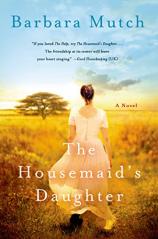The Housemaid's Daughter
Review
The Housemaid's Daughter
The recent passing of Nelson Mandela has gotten a lot of people thinking and talking about South Africa and its history of racial apartheid, which Mandela did so much to help eradicate. Few of us, though, really know or understand the personal history of South Africans who lived under this horrifically damaging set of policies. Barbara Mutch's THE HOUSEMAID'S DAUGHTER changes all that, as she illustrates the conflicts and contradictions of apartheid through the story of one particular family.
The novel opens near the beginning of World War II, as young Ada and her mother, who are black, are employed in the household of a white couple known only to Ada as Master and Madam. Master and Madam have two children: Rosemary, a willful and spoiled girl who largely ignores Ada, and Phil, who becomes Ada's special friend despite negative pressures both within and outside the family, particularly after he returns home from fighting in the war. Shell-shocked and withdrawn, Phil responds only to Ada's care for him, but in the end, Ada's friendship may not be enough to save Phil.
"Mutch's novel is a brisk reminder of just how far South Africa has come --- and how fast things deteriorated there in the years before Mandela came to prominence."
Ada also has a special relationship with Madam. Madam (whose given name is Cathleen) emigrated from Ireland to South Africa as a young woman in order to marry her husband, Edward. Ada comes to know something of Madam's inner life by reading her diary when she cleans the house. As for Madam, she is an accomplished pianist, and when Ada shows more aptitude and interest in the piano than Rosemary does, Madam takes her on as a pupil, much to Master's dismay. She also teaches Ada to read English, a skill possessed by few black people at the time.
When Madam, in response to a crisis, travels to Johannesburg to visit Rosemary, something happens that eventually sends Ada fleeing from the white household to the black township. She finds shelter with her auntie, but soon even the older woman rejects her. Fortunately, Ada's education and her musical ability allow her to find a job, but she remains estranged from Madam and at risk of ostracism --- or worse --- from both the white and black segments of society. As apartheid, and opposition to it, rises around them, might this highly unusual family find a new way to coexist in a society that tells them such a thing is impossible?
Narrated from Ada's point of view, THE HOUSEMAID’S DAUGHTER is interspersed with excerpts from Madam's diary that also allow the reader to gain insight into her character and background. At times, Ada's ignorance may come off as patronizing (even as a young woman, for example, she has a hard time understanding the concept of a "future"), but her naivete serves a narrative purpose, as readers learn along with her about the harsh racial policies dividing her country. Mutch's novel is a brisk reminder of just how far South Africa has come --- and how fast things deteriorated there in the years before Mandela came to prominence.
Reviewed by Norah Piehl on December 13, 2013
The Housemaid's Daughter
- Publication Date: January 13, 2015
- Genres: Fiction, Historical Fiction
- Paperback: 416 pages
- Publisher: St. Martin's Griffin
- ISBN-10: 125005446X
- ISBN-13: 9781250054463




